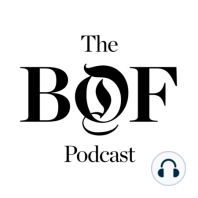26 min listen

Why London Is the World’s Most Exciting Creative City
Why London Is the World’s Most Exciting Creative City
ratings:
Length:
43 minutes
Released:
Sep 15, 2023
Format:
Podcast episode
Description
As London Fashion Week kicks off, BoF founder and editor-in-chief Imran Amed sits down with four London-based creative talents to explore how the city’s rich creative scene stems from its unique cultural diversity and the sense of community and collaboration this provides.Background: With over 300 languages spoken within its city limits — more than any other metropolis — London has cemented its place among the world’s most global cities. This has boosted its reputation not only as a creative hub, but also as a source of inspiration for creatives around the world working in sectors from fashion and media to music and art.“London has a rich Diasporic culture, and it's where… you have the opportunity to build a community around you,” says fashion designer Jawara Alleyne. “London, being such a vast city, gives that space [for] these multiple different cultures that are existing on top of each other and inspiring each other and feeding off of each other.”This week on The BoF Podcast, BoF founder and editor-in-chief Imran Amed chats with four exciting Londoners shaping the city’s creative scene.Alleyne joins conceptual artist Amber Pinkerton, musician Bradley Miller and Dazed editorial director Kacion Mayers to discuss their experiences of living, working and creating in London and to hear their advice for other creatives looking for their big break. Key Insights:London’s history of thriving subcultures has helped create an inclusive community spirit, says Alleyne, where “the people around you actually have a shared experience that you can amplify. You're no longer just speaking for yourself, you're speaking for all of the other groups of people who feel the same way that you feel.”Creatives starting out in London should channel their inner courage, says Pinkerton. “Don't be afraid to approach people or bother them… not being afraid to ask for advice, not being afraid to also get… feedback or criticism about things,” she says. Boldness alone isn’t enough, Mayers believes. “You need to really find your community, hone in on that and just work with each other and build on each other and create with each other and stay true to what you want to communicate and what you want to create,” he says. Mayers added that his own London community is a frequent reference in his work. “I always want to reflect back to the community. I always want people to open Dazed and… see things that they can recognise and see things that's aspirational… And I think that's key to a lot of people’s success, just being able to reflect a reality,” he says. Miller believes the industries that hindered creatives of colour in the past need to change if they want to remain relevant. “These systems and infrastructures… have to adapt to what we're [industry creatives of colour] doing because this is what's happening right now. For them to be relevant or seem to be functioning, they have to [provide] support in these things that are happening in their city,” says Miller. Additional Resources:Meet the Creative Agency Behind Those Viral Dazed Covers: New School, a agency out of London reps a fast-rising group of tight-knit creatives, including members of the teams behind last fall’s Dazed covers featuring Rihanna and Harry Styles, campaigns for Apple and Klarna, and a show for Thebe Magugu. Hosted on Acast. See acast.com/privacy for more information.
Released:
Sep 15, 2023
Format:
Podcast episode
Titles in the series (100)
Diversity and Inclusivity: Fashion’s Missed Opportunity (Joan Smalls, Hari Nef, Tim Blanks and Ivan Bart) | BoF VOICES: At #BoFVOICES 2016 Tim Blanks chaired a discussion on diversity and inclusion between president of IMG Models Ivan Bart, mixed-race model Joan Smalls and transgender American actress and model Hari Nef. To sign up to the Daily Digest newsletter click the... by The Business of Fashion Podcast